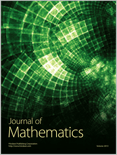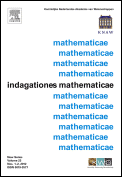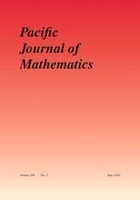
PROCEEDINGS OF THE INDIAN ACADEMY OF SCIENCES-MATHEMATICAL SCIENCES
Scope & Guideline
Exploring Diverse Mathematical Disciplines for Tomorrow's Challenges
Introduction
Aims and Scopes
- Algebra and Number Theory:
This area encompasses research related to algebraic structures, number theory, and their applications, including studies on groups, rings, fields, and the properties of various number systems. - Geometry and Topology:
Research in this scope focuses on the properties and relationships of geometric shapes and topological spaces, including differential geometry, algebraic geometry, and the study of manifolds. - Analysis and Functional Analysis:
This includes research on real and complex analysis, functional analysis, and the study of various mathematical functions and their properties. - Applied Mathematics:
This area covers the application of mathematical methods to solve real-world problems, including numerical analysis, optimization, and mathematical modeling. - Mathematical Physics:
Research in this scope involves the intersection of mathematics and physics, exploring mathematical frameworks for understanding physical phenomena. - Combinatorics and Discrete Mathematics:
This area includes studies on combinatorial structures, graph theory, and discrete mathematical problems, focusing on counting, arrangement, and optimization.
Trending and Emerging
- Algebraic Geometry and Moduli Spaces:
This theme has gained traction, with increased focus on the study of algebraic varieties and their parameter spaces, reflecting a growing interest in the geometric aspects of algebra. - Nonlinear Partial Differential Equations:
Research on nonlinear PDEs has become more prominent, driven by their applications in physics and engineering, as well as their intrinsic mathematical challenges. - Combinatorial Optimization:
The rise of combinatorial methods to solve optimization problems has become a significant trend, reflecting the increasing importance of discrete mathematics in practical applications. - Mathematical Data Science:
With the surge in data-driven research, mathematical techniques applied to data science, including statistical methods and machine learning, are emerging as a critical focus area. - Topological Data Analysis:
This new area focuses on the application of topology to understand the shape of data, highlighting the intersection of algebraic topology and data science.
Declining or Waning
- Classical Geometry:
Research centered on classical geometric constructs and their properties has seen a decline, possibly due to a shift towards more abstract or computational approaches in geometry. - Elementary Number Theory:
While still a key area, the focus on basic concepts in number theory, such as divisibility and congruences, seems to be waning as researchers pursue more complex and applied aspects of number theory. - Traditional Algebraic Structures:
The study of traditional algebraic structures like groups and rings has decreased, with a growing emphasis on more advanced and abstract algebraic concepts.
Similar Journals

PUBLICATIONES MATHEMATICAE DEBRECEN
Pioneering Insights in Theoretical and Applied MathematicsPublicationes Mathematicae Debrecen is a renowned international journal published by the University of Debrecen, Institute of Mathematics, situated in Hungary. This journal, with both ISSN 0033-3883 and E-ISSN 2064-2849, has established itself in the field of mathematics since its inception, with coverage extending from 1997 to 2024. Recognized for its rigorous academic standards, it currently holds a Q3 ranking in the mathematics (miscellaneous) category for 2023 and ranks at the 42nd percentile among general mathematics journals in Scopus. Publicationes Mathematicae Debrecen aims to disseminate high-quality research across various areas of mathematics, contributing to the advancement of knowledge and practice in this dynamic field. Although it is not an open-access journal, its readers can access a wealth of scholarly work that addresses both theoretical and applied mathematical issues, making it an invaluable resource for researchers, professionals, and students alike.

TRANSACTIONS OF THE AMERICAN MATHEMATICAL SOCIETY
Unveiling Insights in the Mathematical RealmTRANSACTIONS OF THE AMERICAN MATHEMATICAL SOCIETY, published by the American Mathematical Society, is a premier journal in the field of mathematics that has been contributing to the advancement of mathematical knowledge since 1900. With an ISSN of 0002-9947 and an E-ISSN of 1088-6850, this journal holds a prestigious position in the academic landscape, evidenced by its Q1 rankings in both Applied Mathematics and Miscellaneous Mathematics categories as of 2023. With a Scopus ranking of #97 in General Mathematics and a percentile standing of 75th, the journal is recognized for its rigorous peer-review process and the quality of the research it publishes. Though it does not currently offer open access options, it essentially serves as a vital resource for researchers, professionals, and students seeking critical insights and developments in mathematical theory and applications. The Transactions aim to publish high-quality research articles that foster the exchange and dissemination of ideas, supporting the growth of both theoretical and applied mathematics within the global scholarly community.

Journal of Mathematics
Cultivating dialogue among mathematics enthusiasts.Welcome to the Journal of Mathematics, a premier open access journal published by Hindawi Ltd, dedicated to advancing knowledge in the diverse realm of mathematics. Since its inception in 2013, the journal has provided a platform for the dissemination of significant mathematical research and applications, achieving recognition in the 80th percentile of the general mathematics category as per Scopus rankings. With a commitment to fostering academic collaboration and accessibility, the journal promotes critical dialogue among researchers, professionals, and students alike. Located in the vibrant academic hub of London, England, the Journal of Mathematics continues to enhance its impact within the mathematical community, as evidenced by its Q3 classification in mathematics (miscellaneous) for 2023. Join us in exploring groundbreaking research and innovations, as we converge towards the future of mathematical sciences through our open access model.

INDAGATIONES MATHEMATICAE-NEW SERIES
Bridging theory and application in cutting-edge mathematical research.INDAGATIONES MATHEMATICAE-NEW SERIES is a distinguished academic journal specializing in the field of mathematics, with a focus on both theoretical and applied aspects of the discipline. Published by Elsevier, a leading publisher in the scientific community, this journal has established itself as a crucial platform for the dissemination of high-quality research. With an ISSN of 0019-3577 and an E-ISSN of 1872-6100, it operates out of the Netherlands and has been a vital resource for academics since its inception in 1969. Currently, it holds a Q2 ranking in the mathematics category, signifying its relevance and impact in the field, with a Scopus rank of #222 out of 399 in General Mathematics, placing it in the 44th percentile. Although it does not currently offer Open Access options, INDAGATIONES MATHEMATICAE-NEW SERIES is committed to contributing to the advancement of mathematics by publishing original research articles, reviews, and notes that enrich the academic community. Researchers, students, and professionals alike will find invaluable insights and developments within its pages, making it a cornerstone journal for those keen on exploring the complexities of mathematics.

PACIFIC JOURNAL OF MATHEMATICS
Unveiling Innovative Research in the Realm of MathematicsThe PACIFIC JOURNAL OF MATHEMATICS, established in 1951 and published by Mathematical Sciences Publishers, is a premier peer-reviewed journal in the field of mathematics, renowned for its rigorous scholarship and impactful research contributions. With an HIndex that reflects its sustained academic influence, this journal has been categorized within the Q1 quartile in the field of mathematics (miscellaneous) as of 2023, showcasing its position among the top-tier mathematics journals globally. Although the journal operates under a traditional subscription model rather than an Open Access format, it remains dedicated to disseminating original research that spans various domains within mathematics. Researchers, professionals, and students alike will find the journal's breadth of topics and commitment to quality work instrumental in advancing their understanding and exploration of mathematical concepts. This esteemed journal continues to thrive as a vital resource for the mathematical community through its comprehensive collection of articles from a diverse range of mathematical disciplines, thus maintaining a significant role in shaping the future of mathematical inquiry.

INDIAN JOURNAL OF PURE & APPLIED MATHEMATICS
Exploring the Depths of Pure and Applied MathematicsINDIAN JOURNAL OF PURE & APPLIED MATHEMATICS, published by the INDIAN NATIONAL SCIENCE ACADEMY, stands as a vital resource in the realm of pure and applied mathematics since its inception in 1996. With ISSN 0019-5588 and E-ISSN 0975-7465, this journal aims to disseminate original research that advances the understanding and application of mathematical principles. Operating out of New Delhi, India, it serves a diverse readership comprising researchers, scholars, and practitioners in the mathematical sciences. Recognized within the Q3 category in both Applied Mathematics and Miscellaneous Mathematics as per the 2023 category quartiles, the journal emphasizes rigorous peer-reviewed articles that contribute to its impact in academia, reflected in its Scopus rankings. Although it does not currently operate as an open-access journal, it maintains a commitment to quality and accessibility of scholarly content, striving to foster academic collaboration and innovation. The convergence of full-text issues from 1996 to 2024 highlights its ongoing dedication to the evolution of mathematical research.

Acta Mathematica Vietnamica
Fostering Global Collaboration in Mathematical ResearchActa Mathematica Vietnamica is a reputable journal in the field of mathematics, published by Springer Singapore Pte Ltd. With an ISSN of 0251-4184 and an E-ISSN of 2315-4144, this journal has been a significant platform for disseminating research findings and advancements in mathematical theories and applications since its inception. It currently holds a Q3 ranking in Mathematics (miscellaneous) for the year 2023, reflecting its growing influence within the academic community. Despite being based in Singapore, Acta Mathematica Vietnamica resonates globally, attracting contributions from researchers and professionals worldwide. While the journal operates under a subscription model, it offers robust access options, ensuring that critical research is accessible to a diverse audience. Researchers and students will find invaluable insights within its pages, facilitating a deeper understanding and exploration of advanced mathematical concepts. As it continues to converge from 2011 to 2024, this journal remains dedicated to fostering innovation and collaboration in the mathematical sciences.

CANADIAN JOURNAL OF MATHEMATICS-JOURNAL CANADIEN DE MATHEMATIQUES
Elevating research standards in the world of mathematics.Canadian Journal of Mathematics - Journal Canadien de Mathématiques is a prestigious peer-reviewed journal published by Cambridge University Press, which aims to advance the field of mathematics through the dissemination of high-quality research articles. With its ISSN 0008-414X and E-ISSN 1496-4279, the journal plays a pivotal role in fostering mathematical research and collaboration. It has been recognized for its impactful contributions, currently holding a category quartile ranking of Q2 in Mathematics (miscellaneous) for 2023 and sits in the 66th percentile among its peers according to Scopus rankings. As the journal continues its convergence from its inception in 1994 through to 2024, it remains a vital resource for researchers, professionals, and students seeking to stay at the forefront of mathematical developments. The journal does not operate under an open access model, allowing for a curated collection of articles that adhere to rigorous academic standards.

Research in the Mathematical Sciences
Connecting Ideas Across Mathematical FieldsResearch in the Mathematical Sciences is a prestigious journal published by Springer International Publishing AG, specializing in a diverse range of mathematical disciplines. With an ISSN of 2522-0144 and an E-ISSN of 2197-9847, this journal operates out of Switzerland and has established a reputation for excellence in research dissemination since its inception in 2014. The journal is currently ranked in the highly regarded Q2 quartile for Applied Mathematics, Computational Mathematics, and Mathematics (miscellaneous), along with a Q3 rank in Theoretical Computer Science, reflecting its substantial influence within the academic community. Researchers will find great value in this journal as it features high-quality, peer-reviewed articles that contribute to the advancement of mathematical sciences. The journal promotes open access options, facilitating greater accessibility to innovative research findings. With its comprehensive scope and strong Scopus rankings, Research in the Mathematical Sciences serves as an essential resource for academics, professionals, and students eager to stay at the forefront of mathematical research and its applications.

Ukrainian Mathematical Journal
Empowering Mathematicians with Rigorous ResearchThe Ukrainian Mathematical Journal is a prominent academic publication in the field of mathematics, focusing on a diverse range of topics that appeal to researchers, professionals, and students alike. Published by Springer, this journal has been an important platform for disseminating significant mathematical research since its inception in 1957. With the aim of fostering knowledge and collaboration within the mathematical community, the journal curates high-quality articles that meet rigorous scholarly standards, evidenced by its Q3 ranking in the miscellaneous mathematics category for 2023. Although it currently does not offer open access, the journal remains accessible through various institutional subscriptions. It serves as a vital resource for ongoing discourse in the field and invites contributions that further advance mathematical understanding.